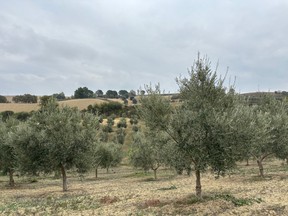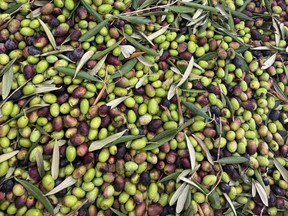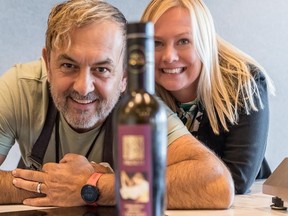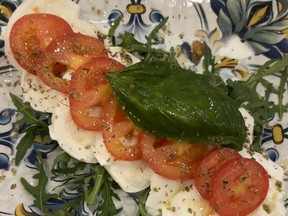Why buying the right olive oil is so important for your health

Article content
Reviews and recommendations are unbiased and products are independently selected. Postmedia may earn an affiliate commission from purchases made through links on this page.
The cost of groceries are weighing on Canadians, but to keep families healthy and well-fed, olive oil could be the answer.
On a recent trip to Italy, I was able to tour olive fields and factories, thanks to Pure Olive Oil From Europe.
It was an eye-opening experience to witness the process from beginning to end — from seeing the fields of centuries-old trees lovingly spaced and cared for, to the removal of olives from said trees, and then watching them get weighed, washed and divided before being crushed to extract the oil.
Upon tasting different kinds of oils, I discovered that the olive oil I have been cooking with all this time isn’t always what I should be using.
First, let’s get this out of the way — a good, quality olive oil isn’t cheap.
But when it comes to making your money count, it’s an undisputed way of benefitting heart health — all while serving as a base, and finisher (more on that in a bit), for many dishes.

It’s no coincidence that the Mediterranean way of living is one of the healthiest in the world.
But it’s also achievable here, thanks to the right olive oil.
Two people living that life are power couple Anita Heidema, an author and life strategist, and world-renowned chef Dario Tomaselli. They embrace olive oil and make it central to their successful Mediterranean lifestyle.

“Olive oil in healthy eating is the most important thing,” Tomaselli told the Toronto Sun.
He pointed out that olive oil and extra virgin olive oil are extremely different, noting they differ on one very important factor: Acidity.
“The high percentage of the acidity actually cleanses; it’s adding perfection to the impurities,” he explained, referring to a pure extra virgin olive oil.
Heidema added: “It a plant-based unsaturated fat that your body needs. All the properties and nutrients it has are so important.”

She learned firsthand how test studies showed that olive oil could reduce and lower cholesterol from Southlake Regional Health Centre’s lipids centre in Newmarket.
And the thing is, you don’t need much.
“You would use extra virgin olive oil much less than another olive oil because you only need a fairly small amount to use as a condiment, as a finishing product,” Tomaselli, a culinary professor at George Brown College, noted.
“Regular olive oil has a lower acidity and also has less flavour and less colour.”
The more processing olive oil goes through, the longer its shelf life, meaning extra virgin is the least processed and most fresh.
RECOMMENDED VIDEO
That said, a good, quality olive oil — particularly one from Italy, which has been touted as the world’s best — can tug at the purse strings, costing anywhere from $15 and up per bottle.
But Tomaselli, who was born and raised in Italy, called it an “investment” and argued that the benefits are priceless as olive oil is not only used for its flavour in cooking and eating but also for its health properties, particularly lowering the risk of heart disease and cholesterol.
He recommended reading the labels so you get the purest olive oil, “not a mix of who knows what.”
While people tend to look at the price before examining the label, Tomaselli suggested to “focus more on a good, simple product. You don’t even need salt; just a drizzle of olive oil and you’re done.”

Tomaselli recommended people purchase two different types — a regular olive oil for cooking and a high-quality extra virgin you can use raw.
That said, Heidema insisted there is no harm in using extra virgin for cooking, but noted that “the quality changes and then it’s not worth the extra money you paid for it.”
She added: “Just like you don’t put olive oil in the water before you put the pasta in because then you have just wasted the quality.”
Another thing shoppers should look for is that the oil comes in a dark bottle.
“Make sure it’s in a dark glass so sunlight doesn’t get to it, and store it away from the stove, not above or on it, because you want to keep it cool and in a dark place,” Heidema said.
The cost continues to be a huge sticking point for many, even with all the health benefits that come with it, but Tomaselli is adamant.
“You can go to McDonald’s, it will cost you $30 and it will clog your arteries,” he said. “Or you can get something that will cost you $30 and it’ll last you a very long time, as long as you use it in moderation.”
He continued: “We need to take control and accountability of our own bodies. If we start by really dissecting the products that we choose, and focus more on the fuel we put into our bodies, we’re going to have longevity and a better way of living.”














Postmedia is committed to maintaining a lively but civil forum for discussion. Please keep comments relevant and respectful. Comments may take up to an hour to appear on the site. You will receive an email if there is a reply to your comment, an update to a thread you follow or if a user you follow comments. Visit our Community Guidelines for more information.